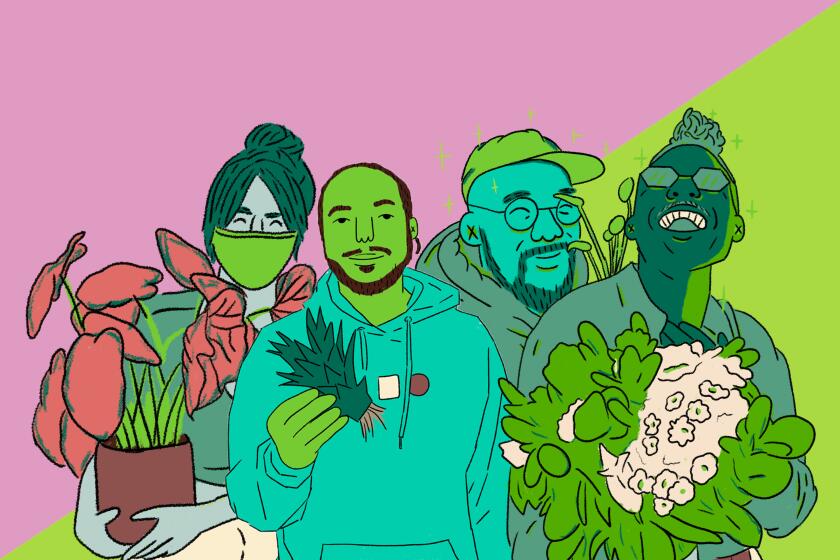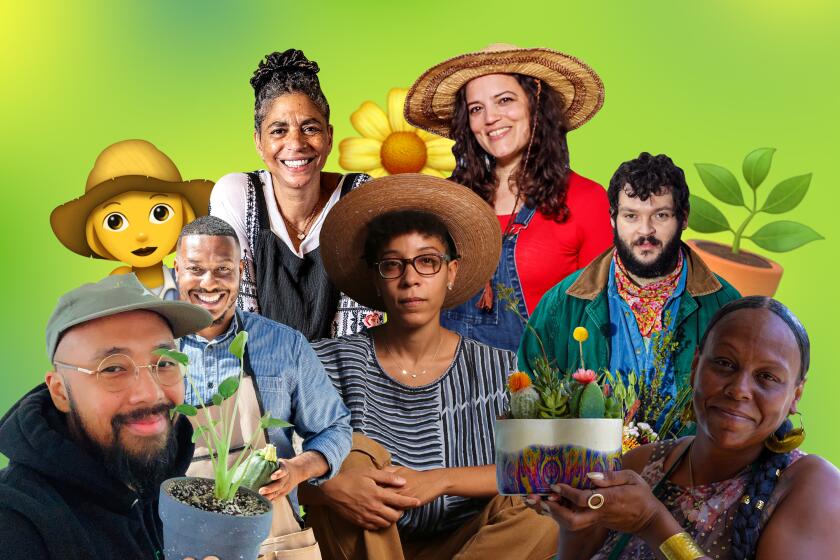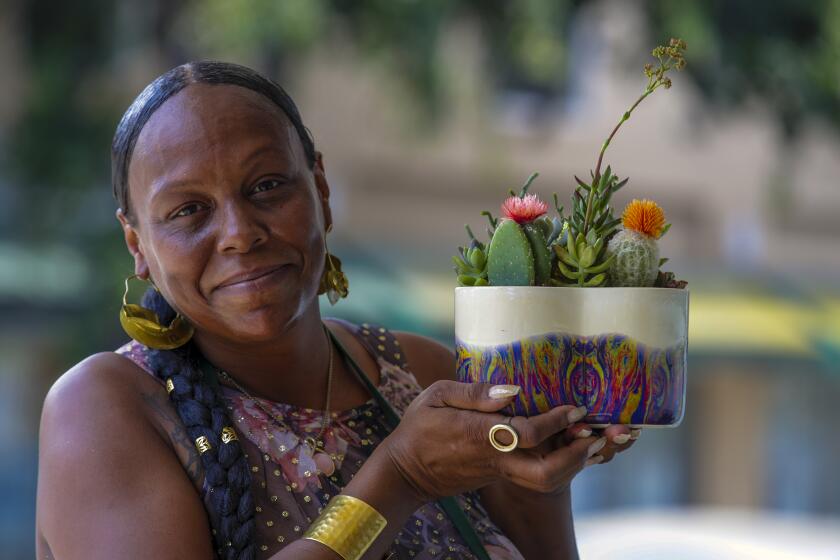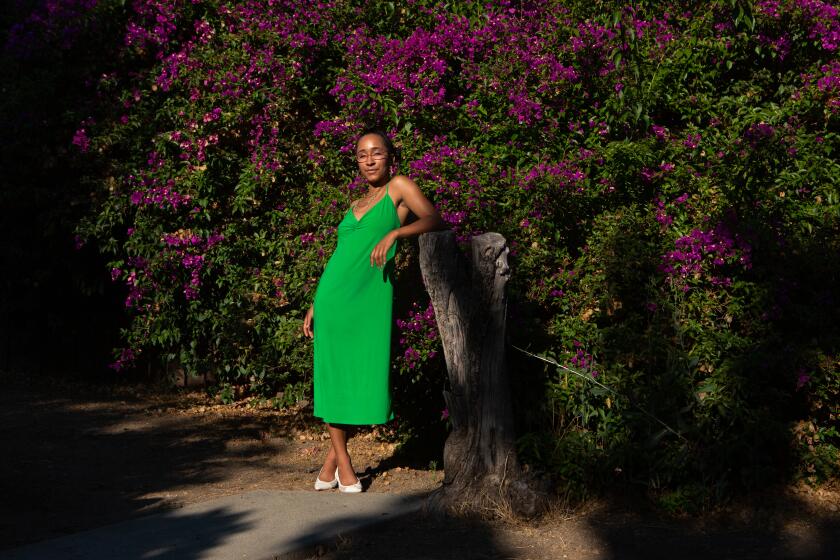Foraging, gardening, joy — how two Black plant influencers use their platforms
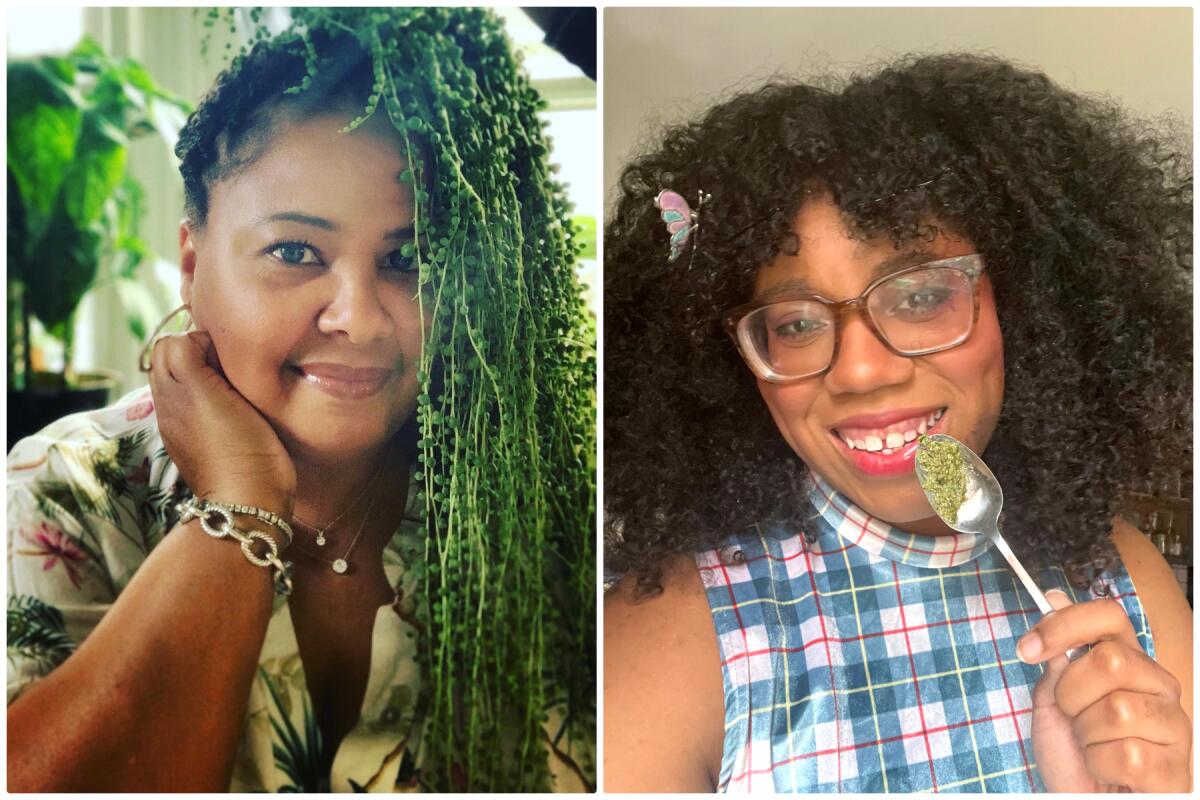
Black history often focuses on the pain and suffering of Black people, from chattel slavery to modern-day police brutality. But look closely and you’ll find hope, community and an existence that extends beyond marginalization, particularly when it comes to plants.
We spoke with two celebrated plant influencers — Alexis Nikole Nelson, known on TikTok as the Black forager, and Instagram gardener Kamili Bell Hill, who runs Plant Blerd and Black People with Plants — and asked them to share how they are using their platforms to celebrate the connection between Black joy and plants while providing some joyful plant picks that all plant lovers can appreciate.
Plants ‘flipped a switch in me’
“I was really lucky to get love of the outdoors from both sides of my family, because I know that not all Black kids, especially Black kids in Ohio, are lucky enough to get that,” said Nelson, who still lives in Ohio.
As a child, she learned that the plants that some may consider weeds are not only edible but in some cases exceptionally tasty.
Realizing what plants were capable of “flipped a switch in me,” she said. “The rest of my childhood, every time someone would mention a random plant that I recognized being edible, I’d be like, ‘Oh, my God, OK, I got to store this away for later.’”
Nelson found a use for her mental inventory of edible plants in college. Her budget was tight and she didn’t want to eat ramen and ice cream every day. So she began to include curly dock leaves in sauteed noodles and lamb’s quarters in her salads.
In our Plant PPL series, we interview people of color in the plant world, including plantfluencers, plant stylists, floral artists, enthusiasts, experts and garden store owners.
Today her TikTok channel has 2.9 million followers and 51.9 million likes. But she started small. What began as running a company TikTok account that had nothing to do with foraging transformed into Nelson deciding to explore the app for herself. When the pandemic began, she used her skills to help people access food safely and free of charge.
“I just filmed the video walking through my neighborhood and said: ‘Here are five plants that I know you can find in your neighborhood to help stretch your groceries, since we’re all a little nervous about going to the grocery store right now,’” and the video performed exceptionally well.
Why does she identify as a Black forager and not just a forager?
“For me, foraging as a Black woman is a rebellion through restoration of knowledge,” she said, captioning a video on the topic “Black history meets Black joy.”
“I would describe Black joy as just unbridled enjoyment of whatever it is we want to be doing,” she said. “No holding back. No worries about perception. No worries about whether or not we’re fitting into some sort of social construct. Just leaning into whatever gets us out of bed in the morning unapologetically. That is what Black joy looks like to me.”
Nelson says she finds Black joy when she is authentically herself: outside with her little basket, trowel and boots in an unexplored forest, beach or river.
But she still has to deal with trolls.
“I always get an influx of commentary about my appearance, about the color of my skin, my hair, the gap in my teeth — a lot of people just feeling entitled to expressing their completely unwanted opinions about who I am and the way that I present myself in the world,” she said.
But Nelson doesn’t accept the harassment.
When she defends herself, people sometimes respond angrily, as if such a jovial person isn’t allowed to react to mistreatment and defend themselves. She said she gets the sense that some people would prefer her to fit into a minstrel stereotype.
“Sometimes I get really afraid of fitting into this like almost foraging mammy role where I’m like always here to be calm, cool and accommodating for questions, for unwanted commentary. And that is not what we are trying to do here at all,” she said.
To celebrate Plant PPL’s first year, we asked 20 plant parents, gardeners and plant shop owners from our L.A. Times series for their best advice for growing happy, healthy plants.
Nelson likes to remind people that she is not only “allowed to say something back” to racist comments but is also allowed to call out people who believe her joy is solely for their consumption.
She wants to foster a nurturing community, where everyone can develop a taste for foraging.
As for where you can start, Nelson recommends ocean foraging for edible seaweed. Other plants she joyfully forages include American persimmons, pawpaws, wood nettles and jewelweed, which grows near creeks in Ohio, “where they can keep their feet wet.”
Celebrating ‘everyday Black joy’
“I grew up around my mom and my grandmother. My grandmother had an edible garden, and my mother had all of the houseplants. So there’s no corner of my childhood that plants were not involved. I spent a lot of Saturdays with both of them,” said Hill, who lives in New York, where she works as an interior designer.
In fact, buying a fiddle-leaf fig for a client is what pushed her love of gardening into overdrive.
“I love doing it for peacefulness and relaxation. I mean, there’s so many benefits, but it also feels like a real connection to my past and to my grandmother, to my mom. There’s a lot of connectivity with plants for me.”
When she wanted to share her love of plants with others, Hill discovered that her friends and family weren’t quite as enthusiastic. So she decided to create her own Black gardening communities on Instagram: Plantblerd and BlackPeopleWithPlants.
“Blerd” is a portmanteau of “Black nerd,” and Hill created Plantblerd, which has nearly 29,000 followers, as a space for Black people who nerd out over plants.
Meet La Nola Smith, founder of South Central Succs, a succulent arrangement business in L.A.’s Leimert Park Village that has become a community hub.
“There was this entire community that I didn’t know anything about, and it really has been like a literal breath of fresh air for me, because it’s also just something I do for my own pleasure that doesn’t have anything to do with being a mother, wife, designer. It’s just my thing. It allowed me to carve out enjoyment and creativity for myself.”
BlackPeopleWithPlants — “A love letter to Black people w/plants,” according to the Instagram bio — showcases Black gardeners from around the world. The account has amassed almost 31,000 followers.
“We’re more than a hashtag. There’s more than trauma to our lives,” she said. “I want to celebrate our everyday Black joy.”
Hill founded this Instagram account in the summer of 2020. She noticed that after George Floyd and Breonna Taylor were killed and while Black Lives Matter was trending, Black content was being featured more on social platforms. But only as a response to Black people dying and suffering. Black Lives Matter allyship eventually began to fade, and Black content — especially the kind focused on Black joy — became trickier for her to find.
So she decided to create a page that would focus on the collective joy of Black gardening communities.
“I would describe Black joy as impetuous, and in a very good way. I think it’s really important because plants are healing, and collectively we do need healing. You know, I think that there’s still stigma in our community to seek traditional therapy, and plants are very therapeutic,” she said.
The trauma of enslavement can be seen as disconnecting Black people from the enjoyment of nourishing the land. Personal gardening under slavery was often done to supplement meager diets; foraging, to facilitate escape. For Hill and others, reclaiming the connection to joy can be a means of catharsis that modern medicine and therapy don’t necessarily achieve.
“If there’s any group of people that desperately need [a healing connection with plants], it is people of color, particularly Black people. So I think that is why it’s really important for Black people to grow, and I encourage any Black person I meet to get some plants in their life.”
Hill always has a cutting or succulent ready to go home with a guest.
Hill recommends the classic Monstera deliciosa, as “the leaves are these big, beautiful fenestrated leaves that roll out and they’re this bright neon green. They give me tremendous joy.”
She also suggests growing hoyas, the mini monstera, the ZZ plant, the Manjula pothos and the golden pothos.
Since racial uprisings erupted earlier this year, Black herbalists have begun ramping up resources for Black people going through stress and trauma, exacerbated by a pandemic that’s disproportionately killing their communities.
More to Read
Sign up for The Wild
We’ll help you find the best places to hike, bike and run, as well as the perfect silent spots for meditation and yoga.
You may occasionally receive promotional content from the Los Angeles Times.
